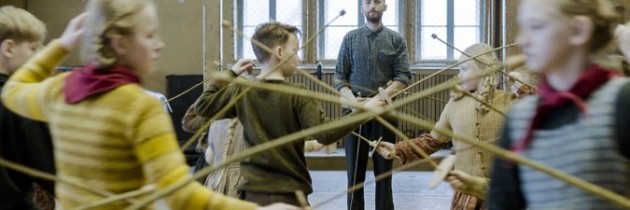The Fencer
In 1953, Stalin rules the Soviet Union with an iron fist. A young Estonian resister named Endel Nelis (Märt Avandi) escapes the inquisitive eyes of the Leningrad KGB by accepting a position as a phys ed teacher in the Estonian Baltic backwater of Haapsalu. Taciturn by nature, and chafing at the bit forced on his homeland under occupation, he has zero rapport with the boisterous youngsters whose energy he is now in charge of channeling. When he tries to initiate an after-school ski club, the sour-faced Soviet lackey of a school principal tells him the school’s equipment has been requisitioned by the military. Nelis – a champion fencer back in Leningrad – parries this blow, posting a flyer about a new fencing club and shaping fencing foils out of sticks. To his surprise, dozens of enthusiastic pupils show up for practice. Firmly but effectively, he begins training them. Meanwhile, a fellow teacher named Kadri (Ursula Ratasepp) shows kindness to gruff Nelis, and a tender romance begins to blossom.
All this alarms the tyrannical school principal. When he sees young people advancing with swords across the gym floor, he decides to put the kibosh on the club. Declaring fencing an elitist, anti-Socialist sport, he tries to ban it. But Nelis has the support of the school’s families, and the fencing program is allowed to continue. Now the principal tries a different tack, instructing a subordinate to dig around in Nelis’s files and find some dirt on him.
After many months of arduous training and increasingly worrying Soviet inquiries into Nelis’s past, the kids get wind of an important tournament. They beg to attend — but Nelis discovers the finals are in Leningrad. His dream of being recognized as a champion is finally in sight; yet if he escorts his team, he’ll be back in the lions’ den. Nelis is faced with a decision that will change his life.
The Fencer is loosely based on the life of the legendary fencing master of Haapsalu. Endel Nelis founded a school for aspiring young swordspeople that still thrives today. Estonia continues to be a superior competitor in both men’s and women’s fencing, picking up gold medals at the 2013 World Championship.
Finnish director Klaus Härö was born in Porvoo and studied in Helsinki. He received the Ingmar Bergman Award in 2004, and four of his films have been chosen as Finland’s submissions for Best Foreign Language Film at the Academy Awards. His new film, handsomely filmed in Estonian and Russian, effectively evokes the austere Soviet era. Through the story contains few surprises (especially to Estonians), it is well-crafted and expertly acted. On the shortlist for the 2016 foreign-language film Oscar, The Fencer will doubtless thrust and parry its way through a number of festivals.
Also published in Cinema Scandinavia: see the film website, which quotes my review.




